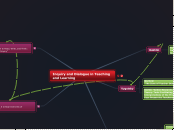Classroom
Dialogic
Alfassi: "The Efficacy of a Dialogic Learning Environment in Fostering Literacy" Zimmerman: "Reflective Teaching Practice: Engaging in Praxis"
Inquiry and Dialogue in Teaching and Learning
Freire
Perry: "What is Literacy? – A Critical Overview of Sociocultural Perspectives"
Critical Lens
Simmons:
"Class on Fire:
Using the Hunger Games Trilogy
to Encourage Social Action"
Gee:
"Literacy, Discourse, and Linguistics: Introduction"
Delpit:
"The Silenced Dialogue:
Power and Pedagogy in Educating Other People's Children"
Inquiry
Teacher's Role
Why Inquiry
Dialogue
Student
With Self and Text
Steenson: "Learning Logs in the Science Classroom: The Literacy Advantage"
With Others
Teacher
With Other Teachers
Putnam: "What Do New Views of Knowledge and Thinking Have to Say about Research on Teacher Learning?"
With Self
Dewey
Wilhelm: "Inquiring Minds Learn to Read, Write, and Think: Reaching All Learners through Inquiry"
Transition to Teacher Inquiry
Classroom Application
Presentation
Investigation
Problem Posing
Essential Question
Vygotsky
Clarke: "Action Research, Pedagogy, and Activity Theory: Tools Facilitating Two Instructors’
Interpretations of the Professional Development of Four Preservice Teachers"
Warford:
"The Zone of Teacher Development"
Bakhtin
Fecho: "Feasts of Becoming:
Imagining a Literacy Classroom Based on Dialogic Beliefs"

